Opinion: Which America do you choose?
Editor’s Note: Sign up to get this weekly column as a newsletter. We’re looking back at the strongest, smartest opinion takes of the week from CNN and other outlets.
“November 5th is going to go down as the single most important day in the history of our country,” former President Donald Trump said after his victories on Super Tuesday guaranteed that he will be the GOP nominee for president.
That reference to Election Day is perhaps the only line in Trump’s speech that President Joe Biden would agree with. Addressing a joint session of Congress Thursday and hearkening back to President Franklin D. Roosevelt’s 1941 “Four Freedoms” speech, Biden made clear that he views the stakes of November 5 just as gravely as Trump does: We “face an unprecedented moment in the history of the Union. … Not since President Lincoln and the Civil War have freedom and democracy been under assault at home as they are today. What makes our moment rare is that freedom and democracy are under attack both at home and overseas at the very same time.”
With nearly eight months to go before the vote for president, the battle lines are clearly drawn between two men who actually have much in common: They were born in the 1940s in an America largely shaped by Roosevelt’s 12 years in office, have spent decades in the public eye, have seen their flaws dissected endlessly by political foes and share the rare experience of serving in the Oval Office.
In another America, they would be collegial members of the Presidents Club, bonding over memories of how they overcame their thorniest challenges. Instead, they are leading bitterly divided factions that accuse the other of trying to tear down the vision of America each embraces.
Presidential elections in our time are often decided by swing voters in a few battleground states but, as last week showed, in the early days of this year’s general election campaign, Biden and Trump are focusing more on rallying their bases for the battle ahead.
Going into the State of the Union address, Democrats were consumed by fear that Biden’s age — at 81, he’s the oldest president ever — would inhibit his ability to campaign forcefully. They came out of the 67-minute speech energized.
“Joe Biden’s third State of the Union speech was a banger, and surely much will be written about how the president defied expectations, broke the stereotype of a worn-out older gentleman and spoke to the American people with vigor, determination and barbed humor,” wrote Jill Filipovic.
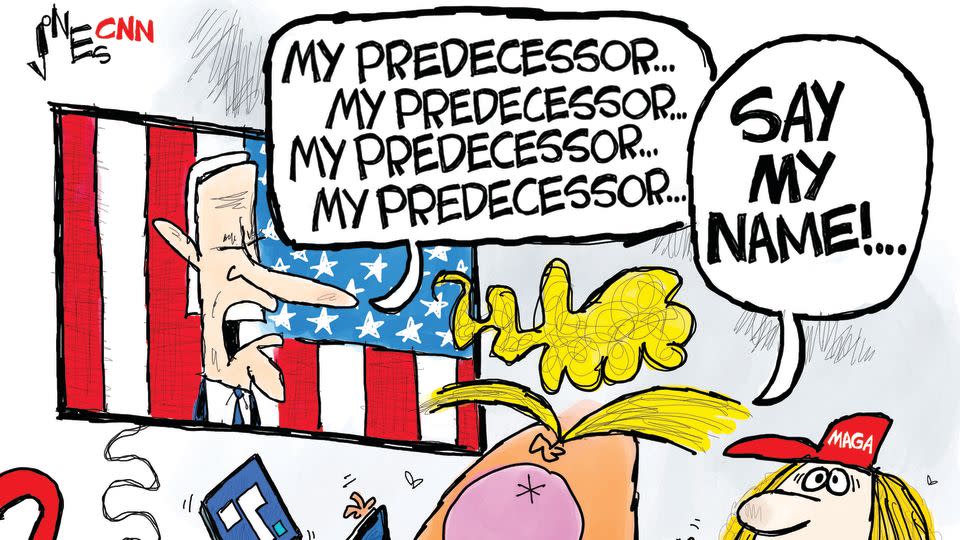
“Passionate, feisty, focused — he came eager to put the gloves on,” wrote David Gergen, who has served in four presidential administrations. “There were moments when he went over the top, promising more than he could possibly deliver, but Democrats felt energy coursing through their veins again.”
“The more salient question is how much Biden may have changed the odds in the overall race. Political veterans tend to think that a strong performance at a State of the Union is worth only three or four days of good press before it fades. Perhaps that will be the case here.”
“But watching as the cheers grew deafening in the hall, one had to wonder: Was it different this time? Can Democrats actually turn this race upside down?”
Too loud?
In the view of Biden’s critics, the problem with the speech wasn’t that it backed up their familiar refrain that the president is too old. Rather, they claimed he was too loud — and too partisan.
“Raising his voice to a sustained shout is Biden’s way of strengthening his stage presence,” wrote Daniel McCarthy, “Do voters find it firm and forceful, or do they feel like they’re being yelled at by an old curmudgeon?”
“Biden lacks the easy-going charisma of a Ronald Reagan or Bill Clinton, and this State of the Union, despite being full of the usual boasts and reassurances, wasn’t an address to set Americans at ease. It was a call to class war, among other things.”
Carrie Sheffield observed, “Immediately out of the gate, President Joe Biden’s State of the Union address was a cynical, partisan campaign stump speech rather than an uplifting, substantive, unifying message.” Sheffield argued that Biden distorted Trump’s record, but many others thought he rightly called out “his predecessor” for a litany of failures.
“Joe Biden finally has my attention,” wrote Roxanne Jones.
“Biden sounded like he’s ready to go toe to toe with former President Donald Trump and win in November.
“Challenging, taunting and even mocking Trump at times without mentioning his name, Biden called out Republicans for way too much talk and very little action on key issues such as immigration reform and stronger border policies.”
“But it was his focus on pocketbook issues where Biden was most effective. The president spoke authentically to Americans about his solutions for the real problems we face closer to home — greedy landlords who charge exorbitant rents, the attacks on women’s reproductive rights and Big Pharma’s price gouging, to name a few.”
For more:
Julian Zelizer: How Biden is flipping the script on Trump
The working class
Will Biden’s message resonate with White working-class voters? Paul Sracic noted that Biden lost White voters without college degrees by 35 points in 2020. “While the aggressive attacks on ‘his predecessor’ and a focus on issues such as climate change were red meat for the more progressive base of Biden’s Democratic party, it’s hard to see how it will win back the support of those who voted for Trump four years ago,” argued Sracic.
“If the party is to woo potential MAGA enthusiasts away from Trump, it is going to have to show struggling White communities that the President not only is like them, but that he is here for them — that he is, in fact, one of them,” wrote Keith L. Magee. “Democrats need to do more to communicate a robust social and economic message that makes it clear that Biden grasps these two simple but essential truths: There is great dignity to be found in every kind of work, and every kind of work deserves to be rewarded.”
Looking ahead to the campaign, Patrick T. Brown wrote, “It is extremely unlikely we’ll learn anything new about either candidate over the next nine months. The most-committed MAGA supporters will be counting down the days to November 5. Some Democrats, worried about threats to democracy or eager to express their opposition to the Dobbs decision overturning Roe v. Wade, may also be excited about their chance to stand against Trump. But for many Americans — including a fair chunk of Republicans — the time between Super Tuesday and Election Day will be a period though which they grit their teeth.”
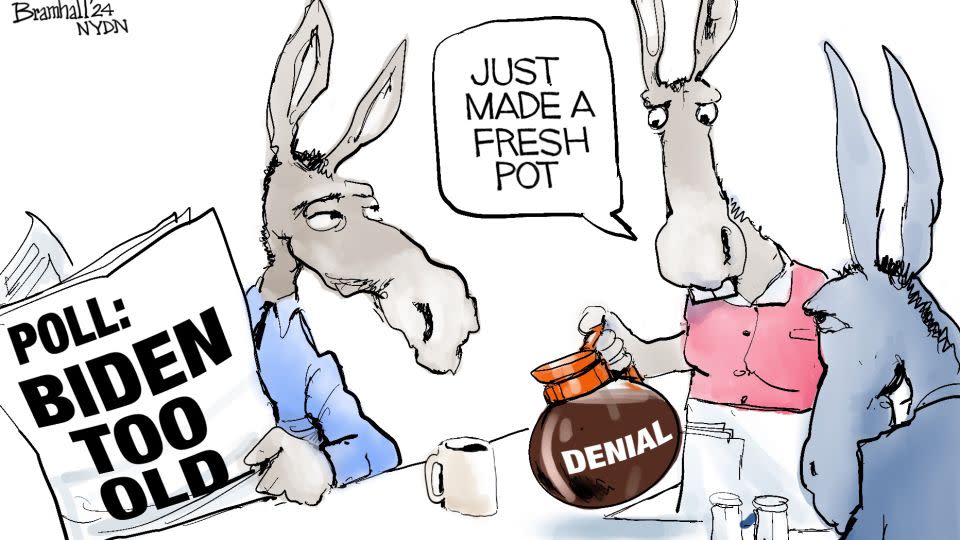
It’s Trump’s party now
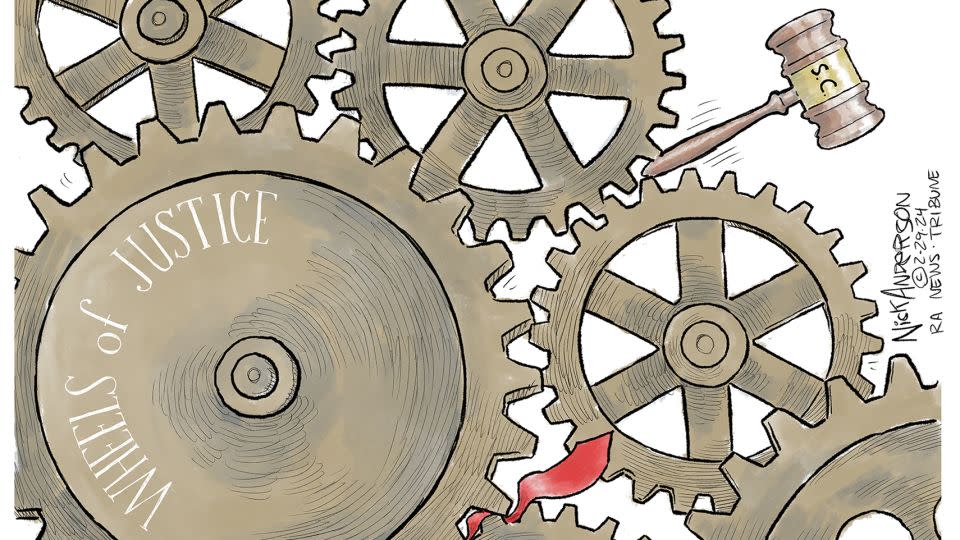
Trump’s victory in nearly all the GOP primaries has united the party behind him in a way he had not achieved in 2016. The Democrats’ hope that four criminal indictments and a variety of civil lawsuits might knock him out of the race has so far been unavailing, though Trump is facing hundreds of millions in court judgments against him.
Last month, the US Supreme Court effectively gave the former president a delay in his Washington, DC, trial by agreeing to hear Trump’s claim to immunity from prosecution, with arguments to take place April 25. And on Monday, the court rejected the attempt of some states to remove Trump from the ballot on the basis of his role in setting the stage for the January 6, 2021 Capitol riot.
Section 3 of the 14th Amendment to the Constitution is “clear and unmistakable,” wrote historian Manisha Sinha. “Any person who has sworn an oath of office to uphold the Constitution and then participated in or given aid and comfort to a violent insurrection against the government of the United States is barred from holding office unless pardoned by two-thirds of both houses of Congress…”
“The Republican Party of the mid-19th century, the party of former President Abraham Lincoln and big government, sought to safeguard the American republic from all future insurrections after the slaveholders’ rebellion that had precipitated a crisis of the Union and Civil War. Historians and legal scholars, who submitted amicus briefs to SCOTUS in Trump v. Anderson, overwhelmingly agreed on Trump’s disqualification, citing copious amounts of evidence from the framers of the amendment and congressional debates. In the interest of full disclosure, I signed one of the briefs and my book was cited in the other,” Sinha noted.
For more:
Frida Ghitis: Trump’s pernicious superpower
David Mark: Bad omens for Trump
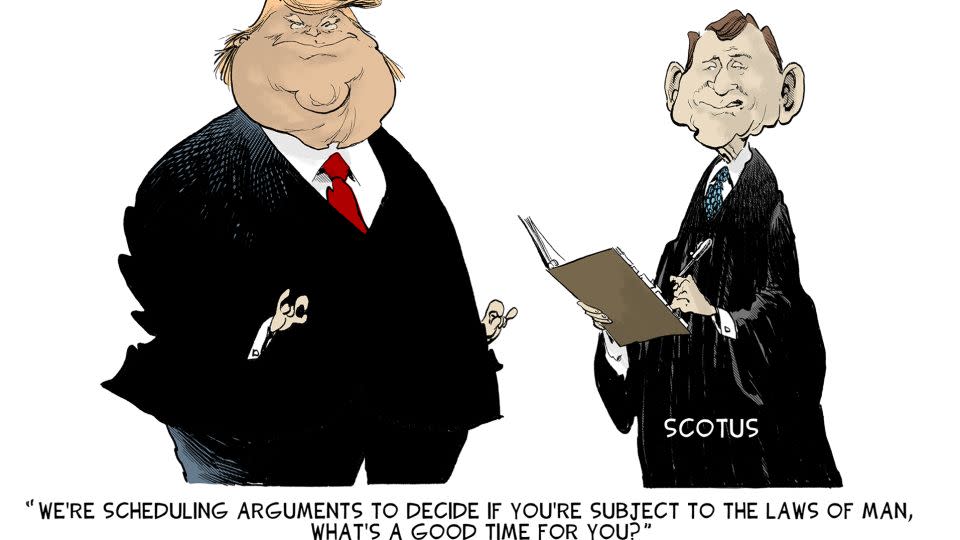
The immigration issue
“Don’t make fun of voters.” That’s the lesson SE Cupp said politicians and the media should have learned in 2016, when Hillary Clinton called Trump supporters “deplorables.”
“On Super Tuesday, the crew over at MSNBC inexplicably did just that,” Cupp pointed out. “After noting that the top issue among a plurality of Virginia GOP voters was immigration and the crisis at the border, the far-left panel thought it a good idea to mock them.”
“The Democratic denial of a border crisis as a real problem until very recently has undoubtedly helped Trump in his reelection bid… this problem is impacting Americans everywhere.”
“Just ask Democratic mayors in New York City, Chicago and Denver who are facing migrant-related crises in their non-border state cities and suburbs.”
Climate records broken
February was the ninth month in a row to set an alarming climate record: it was the hottest February on record, 1.77 degrees Celsius warmer than the average February in pre-industrial times.
News of this kind poses a dilemma for climate scientist Bill McGuire.
“If the fracturing of our once stable climate doesn’t terrify you, then you don’t fully understand it. The reality is that, as far as we know, and in the natural course of events, our world has never — in its entire history — heated up as rapidly as it is doing now. Nor have greenhouse gas levels in the atmosphere ever seen such a precipitous hike.”
“Think about that for a moment. We’re experiencing, in our lifetimes, a heating episode that is probably unique in the last 4.6 billion years….”
“What’s happening to our world scares the hell out of me, but if I shout the brutal, unvarnished truth from the rooftops, will this really galvanize you and others into fighting for the planet and your children’s futures? Or will it leave you frozen like a rabbit in headlights, convinced that all is lost? It is an absolutely critical question.”
For more:
Jason Momoa: From the ashes we rise – how nature can still heal
Credit card fees
Even Cookie Monster is upset about “shrinkflation,” the tactic companies use to covertly increase prices by reducing the size of products like boxes of cereal or cookies. The White House echoed the Muppet’s concern as it sought to show it feels the pain of American consumers coping with higher prices.
As part of Biden’s economic plan, his administration has targeted a variety of consumer fees it wants to reduce or eliminate. As consumer advocate Ed Mierzwinski noted, the Consumer Financial Protection Board announced new rules to “close a loophole that costs Americans more than $14 billion per year in late fees on their credit cards.” In most cases, the new rules will limit late fees to $8, compared to the current average of about $32.
“The new rule wasn’t even out half a day before the US Chamber of Commerce announced it would sue the CFPB. But the CFPB has built its reputation by representing consumers against powerful business special interests.”
For more:
Elena Sheppard: ‘Side Hustlers’ paints a grim picture of American dream
Women’s Day
International Women’s Day arrived last week at a fraught time, noted Kara Alaimo. “This year, women are, in many ways, less safe and have fewer rights and resources than we did just a few years ago. It’s not just that progress has stalled — we’re going backwards.”
Writing from Paris, Euny Hong observed, “America still has tremendous influence globally — though not necessarily in the way it wants. Until not long ago, plenty of places in the world wanted to model themselves after America. But after the US Supreme Court overturned Roe v. Wade almost two years ago, America has, for some nations, become a model … of what not to do.” Last week, she noted, legislators made “France the first country in the world to include abortion rights in their constitution, with a vote of 780–72 in favor.”
”France still has its problems with sexism and misogyny, more than I could fit into a column. But compared to today’s America, France looks like the version of a feminist utopia that could only be dreamed of by Greta Gerwig’s Barbie universe.”
For more:
Jill Filipovic: The bizarre opposition to a Sandra Day O’Connor statue
Jason Kelce

Jason Kelce’s retirement announcement on Monday grabbed the attention of many, including sports historian Amy Bass. “Kelce was retiring after 13 seasons of professional football, stepping away from a career that included, in addition to those Pro Bowl nods, a Super Bowl win (2018) and a Super Bowl loss (2023), the latter against his brother no less, something that was not lost on him in this speech,” Bass wrote.
“But Jason Kelce’s retirement speech gave us so much more than just a sports headline. Not only was I not alone in dropping everything to watch him, I was also not the only one — if TikTok and my sister are any indication — who had tears spilling down my face as I did so. Jason did too, and that was his gift: his speech was a master class in why all men should cry.”
“Ugly cry, in fact.”
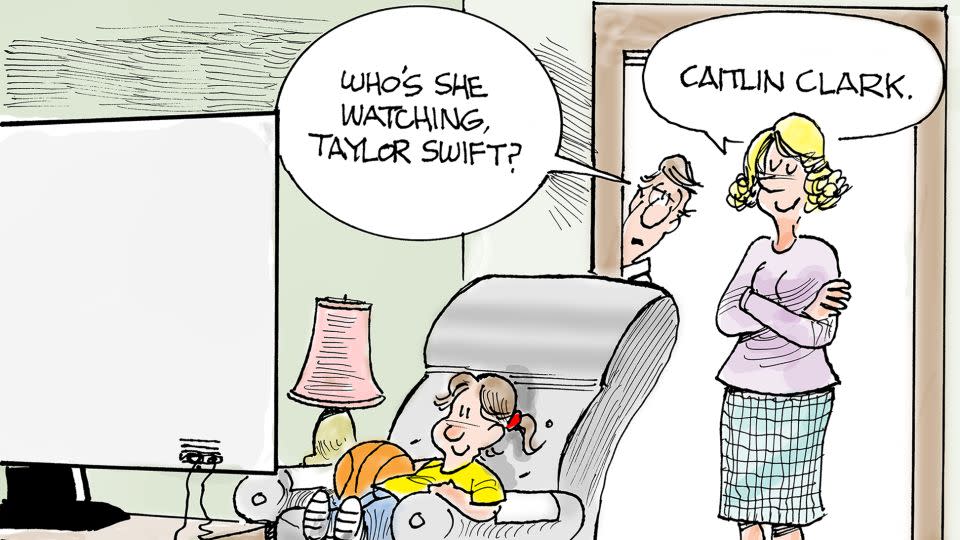
Don’t miss
Errol Louis: New York’s showy crackdown on subway crime is the wrong approach
Liam Kerr: The same forces that drove out Sinema and Manchin are shrinking the Democratic Party
Richard Salgado: The US must step up to protect our vital undersea cables
Sarah Levinson Moriarty: A new flag is going to fly over the White House. My dad would be proud
AND…
Oscars

The Barbenheimer Oscars have finally arrived. And the betting is that “Oppenheimer” will dominate the Sunday night ceremony. But as Noah Berlatsky observed, “Barbie,” win or lose, has the distinction of being one of three movies directed by women to receive a Best Picture nomination, which is the first time that’s happened. (Barbie is distributed by Warner Bros., which shares a parent company with CNN.)
“It’s not an accident that each of the three women-directed films are about the difficulty of telling women’s stories in a world dominated by male power and male narratives. All three films question male conventions and genres in ways that show exactly why we need more films by, and more nominations for, women-directed films,” Berlatsky wrote.
“The effort to rethink old narratives and old genres is why ‘Past Lives,’ ‘Anatomy of a Fall’ and ‘Barbie’ are much more interesting and rewarding than last year’s standard, great man Oscar-bait biopics like Bradley Cooper’s ‘Maestro’ and Christopher Nolan’s ‘Oppenheimer’ or the default enemies-to-friends clichés of Alexander Payne’s ‘The Holdovers.’”
For more CNN news and newsletters create an account at CNN.com

 Yahoo News
Yahoo News 
